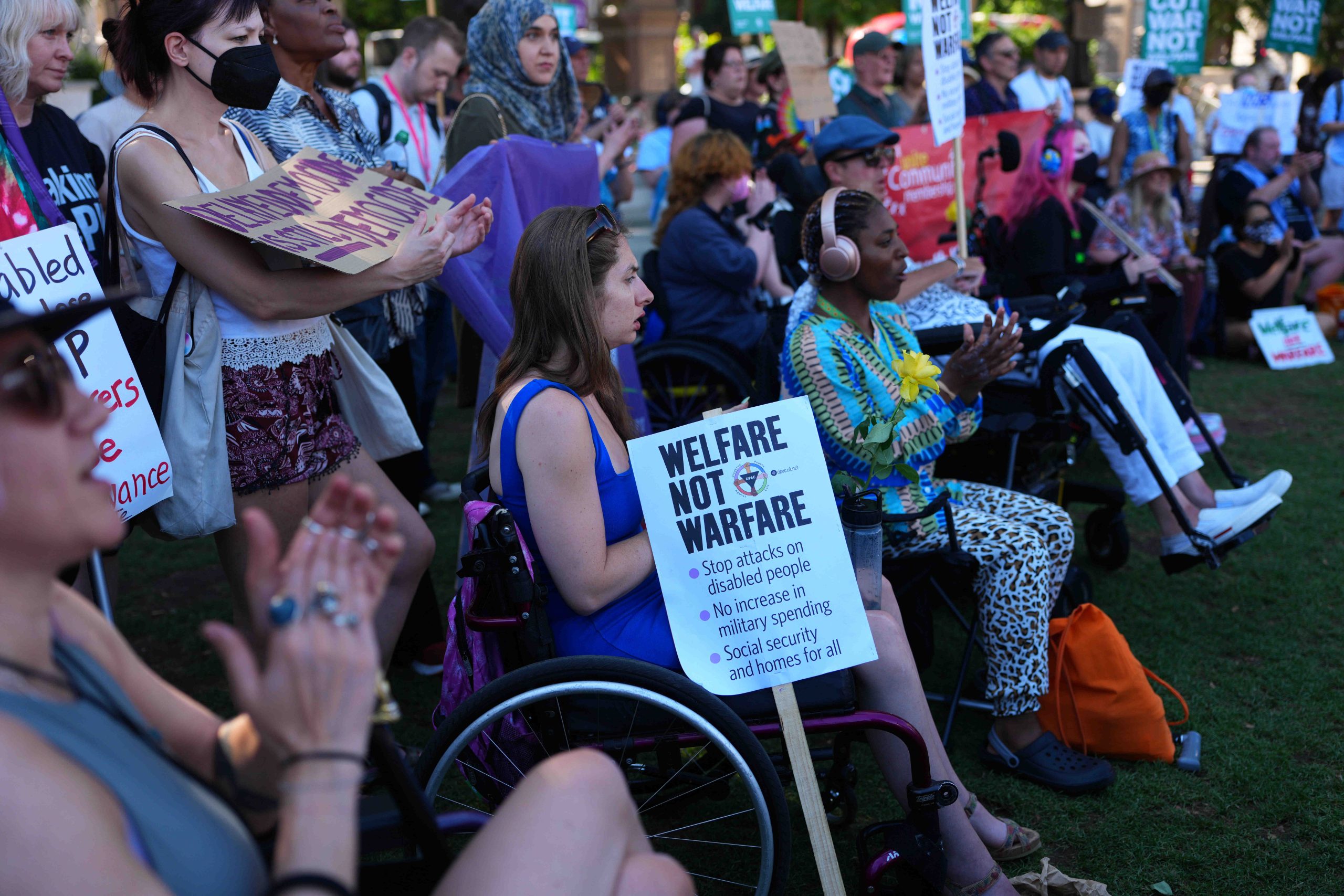Whipping the Party Into Shape
Labour MP Rachael Maskell and her colleagues were stripped of the whip after voting against government plans to cut Personal Independence Payments. In response, she looks to the legacy of social reformers Joseph and Seebohm Rowntree.

People take part in a protest against disability welfare cuts in London, on June, 2025. (Credit: Carl Court via Getty Images.)
In politics, things just happen. I always hope those caught in the moment make the right choices, so that good might follow. That’s the optimism I hold now.
As my three colleagues and I were unexpectedly stripped of the whip last week for voting against government plans to cut Personal Independence Payments, we have to ask: why was breaking the whip met with such a punitive response? After all, we’re hardly the first to disagree. When lives are at stake and poverty is set to rip into the pockets of the poorest — leaving 700,000 sick and disabled people worse off, including an additional 150,000 pushed into poverty — Labour values should surely cry out that this cannot be right. Ours did, joined by the wider labour movement.
Our reasoned amendment consulted with Deaf and Disabled People’s Organisations and charities, and it received the support of over 138 organisations. We amplified the voice of those who were not being heard. The harsh response of suspension has stripped us of the right to represent those who look to us. It is totalitarian in nature, not reflective of the purpose of our party.
It has left sick and disabled people confused and concerned. It has left them poorer. It has left me searching. So I zoom out. I look beyond this moment and reflect.
Over the next year, my city of York is focused on poverty. This year marks 100 years since the death of social industrialist Joseph Rowntree, and next year brings the 125th anniversary of Seebohm Rowntree’s landmark report Poverty, A Study of Town Life, which inspired some of the greatest social reforms in history involving: social housing, pensions, access to the arts and exercise, healthcare for all workers, and, above all, wages that kept poverty from the door.
Today, the Joseph Rowntree Foundation stands among the fiercest critics of the current Universal Credit Bill, advocating that the welfare system should have an ‘Essentials Guarantee’ built into it, to prevent cuts from driving the vulnerable into destitution and providing a level of security for all those who need it.
As I watched His Last Report at York Theatre Royal on Saturday night — a play based on Seebohm’s life — I was reminded of the suffering poverty inflicts, and how directing resources to the right place can free people from its grip. Not just to lift people above the poverty line, but to break the cycle for future generations. The tragedy, drawn out in the play, was that the Great Recession led to workers being laid off, and the poverty cycle restarted once again.
In the play’s final scene, Seebohm was a broken man. He had understood poverty and committed himself to combatting it but knew it would intensify if those in power made the wrong choices. He simply tore up his report and placed it into a brazier.
As I look across my city, I know so many are hanging on by their fingertips — and for some, holding on is already proving too difficult. In the Second Reading debate, I told the story of one of my constituents living with mental health challenges. He was on the edge of life. So why would I vote to make life harder? I am in Parliament to protect people from poverty, to act with compassion and kindness. I will therefore take the lashings from the whip if it means I can keep people safe.
Just look at our country now. Ask yourself: is this progress? We can’t afford for political orthodoxy to keep breaking our nation while others profit from the pain. We as MPs cannot walk through the voting lobbies, applauded by the elite, while others are crushed.
Politics is in existential crisis. It sustains a broken system, a reckless economy, and a violent world. It suppresses those the Labour Party was founded to protect and represent. The obvious danger is that without a plural and broad progressive voice inside Labour and the House of Commons, people will look to other actors, such as Reform, currently casting themselves as against a political elite whilst courting the Trump-playbook of slashing public spending and with it, our key public services.
As Seebohm Rowntree’s report burned in the brazier, the fire within me was lit again. The burning injustices of our time must determine how we speak and how we vote. I had the opportunity to choose whether a light would shine or be snuffed out. I chose light.
Surely this sorry episode must now whip our party back into rediscovering its purpose.